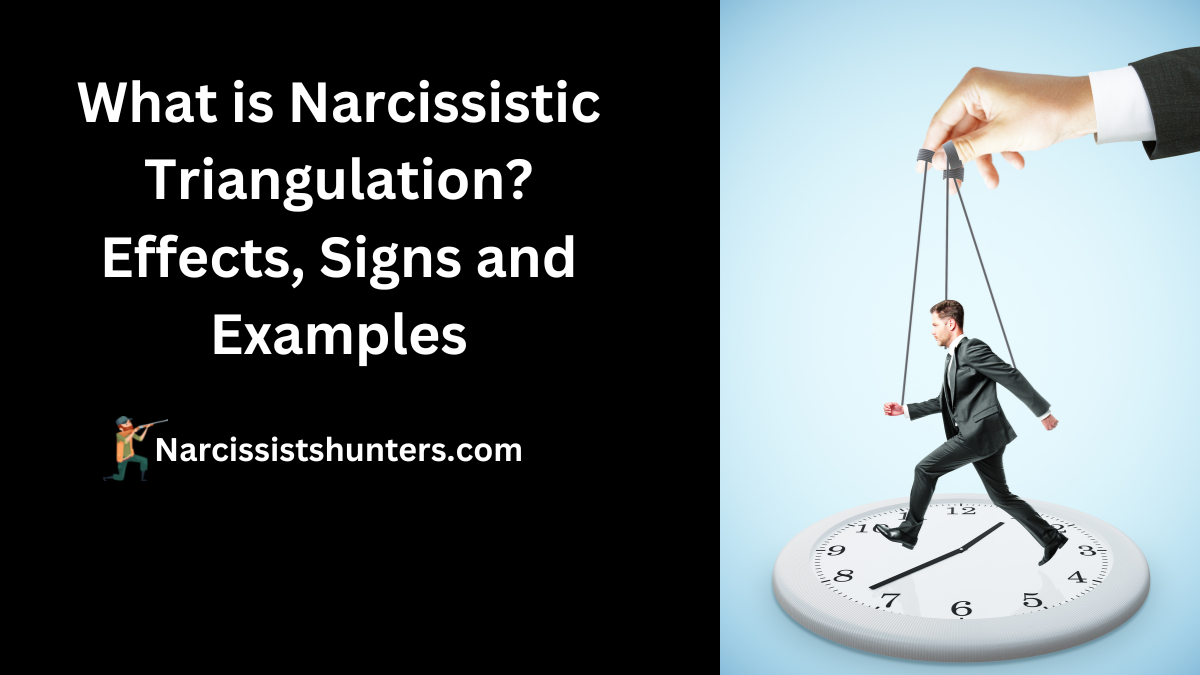Are you struggling in a relationship where you constantly feel compared to others, manipulated, and caught in a web of conflict? You may be experiencing narcissistic triangulation, a toxic dynamic that can have serious effects on your well-being.
In this blog post, I will explore in-depth what narcissistic triangulation is, its effects on individuals and relationships, signs to watch out for, and real-life examples to illustrate this toxic behavior.
Whether you are currently experiencing narcissistic triangulation or suspect that someone in your life may be using this manipulative tactic, this blog post aims to provide insights and information to help you understand and cope with this harmful behavior. So, let’s dive in and shed light on this dark aspect of narcissistic relationships.
1. What is Narcissistic triangulation?
Narcissistic triangulation is a manipulation tactic often used by narcissists to create feelings of insecurity in their partners. The purpose of this is to keep them feeling off-balance and dependent on the narcissist for validation and attention.
It works by deliberately creating a triangle between the narcissist, their partner, and another person. This can be done through flirting, having an emotional affair, or even going so far as to have a physical affair.
Types of Triangulation in Narcissistic Relationships

There are two main types of triangulation commonly employed by narcissists: involving a third party and manipulating a situation.
1. Involving a third party
In this type of triangulation, the narcissist actively involves a third person, such as a friend, family member, or even a new romantic interest, in the relationship.
The narcissist may seek validation, attention, or admiration from the third party while using them as a pawn to gain an advantage or exert control over the other person in the relationship.
For example, a narcissistic partner may confide in a third person about their partner’s flaws or seek sympathy and support, painting themselves as the victim, and gaining validation from the third party while creating tension and insecurity in the relationship.
2. Manipulating a situation
In this type of triangulation, the narcissist creates a situation or circumstance to manipulate the individuals in the relationship. This can include creating conflicts, misunderstandings, or misunderstandings that fuel tension and confusion.
For example, a narcissistic parent may intentionally create a misunderstanding between siblings by misrepresenting information or distorting reality, causing them to compete for attention or affection. The narcissist may then position themselves as the only source of truth or resolution, further enhancing their control and manipulation over the individuals involved.
Narcissists may use a combination of both types of triangulation to manipulate and maintain control over their targets.
They may strategically involve a third party and manipulate situations to create a toxic dynamic where they can continue to seek validation, attention, and admiration while keeping others off balance and uncertain.
Signs of Narcissistic Triangulation

Triangulation is a toxic manipulation tactic used by narcissists to create tension, confusion, and control in relationships. Here are 10 signs of triangulation in narcissistic relationships:
1.Involving a third party
The narcissist frequently brings a third person, such as a friend, family member, or colleague, into your relationship dynamics. They may seek validation, attention, or admiration from the third party while using them as a pawn to gain an advantage or exert control over you.
2.Creating competition
The narcissist pits you against others, either by comparing you to others or by actively creating a sense of competition among individuals in the relationship. They may constantly compare you to their exes, other friends, or even their own family members to make you feel inadequate and insecure.
3. Seeking sympathy or support from others
The narcissist frequently seeks sympathy or support from others, portraying themselves as the victim and garnering validation from others. They may exaggerate or distort events to gain sympathy and turn others against you, creating a distorted reality.
4. Playing the victim
The narcissist portrays themselves as the victim in conflicts or disagreements, manipulating others to take their side and gain sympathy. They may twist facts, distort reality, or play the victim card to gain an advantage and maintain control over the relationship.
5. Using others to communicate
The narcissist may use others to relay messages or communicate with you instead of directly addressing issues with you. They may use third parties as intermediaries to manipulate or control the narrative of the relationship.
6. Withholding affection or attention
The narcissist may withhold affection, attention, or validation from you and instead direct it towards others, creating a sense of competition and insecurity. They may show favoritism towards others and use it as a tool to manipulate and control you.
7. Gaslighting
The narcissist may engage in gaslighting, a form of psychological manipulation, by distorting reality, denying facts, or making you doubt your own perception of events. They may use gaslighting to create confusion and doubt in the relationship, making it easier for them to manipulate and control you.
8. Creating conflicts
The narcissist may deliberately create conflicts or misunderstandings among individuals in the relationship to fuel tension and confusion. They may provoke arguments, misrepresent information, or distort reality to create chaos and maintain control.
9. Blaming others
The narcissist may shift blame onto others, such as blaming you or others for their own mistakes or shortcomings. They may use blame as a way to manipulate and control the narrative of the relationship, diverting attention from their own flaws or shortcomings.
10. Making others choose sides
The narcissist may put pressure on you or others to choose sides in conflicts or disagreements, creating a sense of loyalty or allegiance. They may manipulate others to take their side and turn against you, furthering their control and manipulation over the relationship.
If you are experiencing any of these signs, it is important to trust your gut and to seek professional help in order to address the issue. Narcissistic triangulation can be very damaging to relationships, so it is important to deal with it as soon as possible.
Phrases use narcissists during triangulation
Some of the most common phrases used by narcissists during triangulation include:
- “You’re just too jealous/sensitive”
- “I can’t help it if other people find me attractive”
- “You’re just being paranoid/overly jealous”
- “You’re trying to control me”
- “I’m not doing anything wrong, why are you getting so upset?”
- “I don’t want to get involved, but I heard that [insert person’s name] said [insert negative comment]. What do you think about that?”
- “I’ve noticed that [insert person’s name] has been talking behind your back. You might want to talk to them about it.”
- “I don’t want to come between you, but [insert person’s name] told me that you said [insert negative comment].”
- “Why do you always take [insert person’s name]’s side in arguments? Don’t you see that they’re trying to manipulate you?”
- “I don’t know if you should trust [insert person’s name]. They have a history of lying and manipulating people.”
- “I’m just saying, [insert person’s name] seems to be doing better than you in [insert area of life]. Maybe you should take some tips from them.”
- “I know you’ve been having problems with [insert person’s name], but have you considered that they might just be jealous of you?”
- “I didn’t want to say anything, but [insert person’s name] has been talking about you behind your back. You might want to watch your back around them.”
- “I’m not saying you’re wrong, but have you considered that [insert person’s name] might have a point? Maybe you should listen to them.”
- “I don’t want to take sides, but [insert person’s name] has a lot of experience in [insert area of expertise]. Maybe you should hear them out and see what they have to say.”
Why Narcissist Like Triangulation?
Narcissists like triangulation because it allows them to manipulate and control the people around them. By pitting two people against each other, the narcissist can create a sense of competition and division that makes them appear superior. Additionally, triangulation allows the narcissist to avoid taking responsibility for their actions and feelings, by projecting them onto others.
Triangulation is a tactic used by narcissists to maintain power and control over the people around them. It serves to isolate the victim from their support system, making them more vulnerable to the narcissist’s abuse. The victim is left feeling confused and unsure of themselves, while the narcissist remains in control.
9 Examples of Triangulation in Narcissistic Relationships

Here are 9 examples of triangulation in narcissistic relationships:
1.A Narcissist compares you to others
One common example of triangulation in narcissistic relationships is when the narcissist constantly compares you to others. They may compare your looks, achievements, or qualities to those of other people in order to make you feel inadequate, insecure, or inferior. By constantly comparing you to others, the narcissist creates a sense of competition and jealousy, and uses it as a tool to manipulate and control you.
2. Smear campaigns against you to others
Another example of triangulation in narcissistic relationships is smear campaigns. The narcissist may spread negative and false information about you to others, such as mutual friends, family members, or colleagues, in order to tarnish your reputation, isolate you, and gain sympathy and support for their own agenda.
They may distort facts, exaggerate events, and manipulate others into taking their side, while painting you in a negative light.
3. Playing the victim to gain sympathy from others
Narcissists often play the victim to gain sympathy and support from others. They may exaggerate or fabricate stories of being mistreated or victimized, portraying themselves as the innocent party and seeking validation and admiration from others.
This tactic allows them to garner sympathy and support while manipulating others into taking their side, furthering their control and manipulation over the relationship.
4. Recruiting “flying monkeys” to support their behavior and attack you
Narcissists may enlist the help of “flying monkeys,” which are individuals who support and enable their toxic behavior. These flying monkeys may be friends, family members, or acquaintances who the narcissist manipulates and recruits to attack, criticize, or intimidate you. The narcissist uses these individuals as allies in their triangulation tactics, furthering their agenda and exerting control over you.
5. Sudden disappearance and silent treatment to create anxiety and insecurity
Narcissists may use sudden disappearance or silent treatment as a form of triangulation. They may abruptly cut off communication, ignore you, or disappear without explanation, creating anxiety, insecurity, and confusion.
This tactic is used to exert control and manipulate your emotions, leaving you feeling vulnerable and uncertain about the status of the relationship.
6. Pitting family members against each other
Narcissists may create conflicts and tension among family members, such as siblings or extended family, by pitting them against each other. They may instigate arguments, spread rumors, or manipulate events to create division and chaos within the family dynamic.
This tactic allows the narcissist to maintain control and manipulate the narrative of the relationships, often for their own gain.
7. Creating love triangles or competing for attention in romantic relationships
In romantic relationships, narcissists may engage in love triangles or create competition for attention. They may flirt with others, have affairs, or seek attention from multiple romantic partners to create jealousy, insecurity, and tension. This triangulation tactic allows the narcissist to maintain control, manipulate your emotions, and feed their need for attention and admiration.
8. Using professional or personal relationships to provoke jealousy or insecurity
Narcissists may use their professional or personal relationships to provoke jealousy or insecurity in you. They may brag about their achievements, success, or popularity, or intentionally create situations that make you feel inferior or inadequate.
By leveraging their external relationships, the narcissist manipulates your emotions, creates tension, and maintains control over the relationship.
9. Stirring up conflict between others to distract from their own behavior
Narcissists may instigate conflicts or disagreements between others in order to deflect attention from their own toxic behavior.
They may spread rumors, gossip, or manipulate events to create chaos and confusion, while diverting attention from their own flaws or shortcomings. This tactic allows them to maintain control and manipulate the narrative, deflecting blame from themselves.
Effects of Narcissistic Triangulation on Relationships
The effects of narcissistic triangulation on relationships can be detrimental and damaging. Here are some common effects:
1.Relationship strain
Narcissistic triangulation often creates tension and conflict in relationships. The constant comparisons to others, smear campaigns, and manipulation of situations can cause strain and emotional distress, leading to a breakdown in trust and intimacy.
2. Emotional manipulation
Narcissists use triangulation as a tool for emotional manipulation. By pitting individuals against each other and creating a sense of competition, the narcissist can gain control and power over others. This can lead to emotional manipulation, where individuals may feel pressured to conform to the narcissist’s expectations or seek their approval.
3. Damage to self-esteem
Being constantly compared to others, smeared to others, or made to feel inferior by a narcissist can damage one’s self-esteem and self-worth. The constant invalidation and criticism can lead to feelings of inadequacy, self-doubt, and low self-esteem.
4. Erosion of trust
Triangulation by narcissists often involves spreading false information or distorting reality to gain an advantage or manipulate others. This can lead to erosion of trust in relationships, as individuals may question the narcissist’s credibility and intentions.
5. Isolation and division
Narcissistic triangulation can create a toxic dynamic where individuals are pitted against each other, causing division and conflict.
This can lead to isolation and distancing in relationships, as individuals may become wary of each other due to the narcissist’s manipulation tactics.
6. Psychological distress
Dealing with narcissistic triangulation can cause significant psychological distress, including anxiety, depression, and emotional trauma. The constant manipulation, gaslighting, and emotional abuse can take a toll on one’s mental health and well-being.
7. Negative impact on other relationships
Narcissistic triangulation can also impact relationships with other individuals who are dragged into the dynamic.
For example, in family settings, triangulation by a narcissistic family member can cause tension and conflict among other family members, leading to strained relationships and emotional distress.
Narcissistic triangulation with new supply
When a narcissist senses that their current narcissistic supply is about to leave them, they will often find a new source of supply to keep them hooked. This can often result in a period of triangulation, where the narcissist will compete for the new supply’s attention and try to isolate them from their old support system.
This can be very damaging to relationships, so it is important to be aware of the signs and protect yourself if you are in a relationship with a narcissist.
How to react to Narcissistic triangulation?

Dealing with narcissistic triangulation can be challenging, but here are some strategies that may help you respond effectively:
1.Recognize the tactic
The first step in dealing with narcissistic triangulation is to be aware of the tactic and recognize when it is being used against you. Understanding that it is a manipulation tactic employed by the narcissist can help you see through their behavior and not fall into their trap.
2. Stay grounded in reality
Narcissists often distort reality and rewrite history to suit their agenda. It’s important to trust your own perceptions and memories, and not allow the narcissist to gaslight you or manipulate your perception of reality.
Keep a journal or record of events to maintain an accurate account of what has happened.
3.Set boundaries
Establish clear and healthy boundaries with the narcissist. Let them know that you will not tolerate being compared to others, being involved in their smear campaigns, or being subjected to their triangulation tactics. Communicate your boundaries firmly and assertively, and stick to them.
4. Limit engagement
Minimize your engagement with the narcissist and the third parties they may involve in their triangulation tactics. Avoid getting caught up in their drama or being drawn into conflicts that they may try to instigate.
Keep your interactions with the narcissist minimal and focused on necessary matters.
5. Seek support
Dealing with a narcissist and their triangulation tactics can be emotionally draining. It’s important to have a support system in place. Reach out to trusted friends, family, or a therapist for emotional support, validation, and guidance on how to cope with the situation.
6. Focus on self-care
Narcissistic triangulation can create anxiety, insecurity, and self-doubt. It’s crucial to prioritize self-care and take care of your emotional and mental well-being. Practice self-compassion, engage in activities that bring you joy, and prioritize your own needs and well-being.
7. Seek professional help if needed
Dealing with a narcissist and their triangulation tactics can have a significant impact on your mental health. If you find yourself struggling with emotional distress, anxiety, or depression, consider seeking professional help from a therapist or counselor who can provide you with the necessary support and coping strategies.
Last words
Narcissistic triangulation can be a very damaging and destructive behavior, both for the people involved in the triangle and for the relationship as a whole. If you find yourself in a situation where you are being triangulated by a narcissist, it is important to stay calm and collected.
Don’t fall into the trap of arguing with the other person or trying to prove yourself to the narcissist. Instead, focus on maintaining your own peace of mind and boundaries.
Remember, narcissist is ultimately responsible for their own actions, and you don’t have to let them control you.
